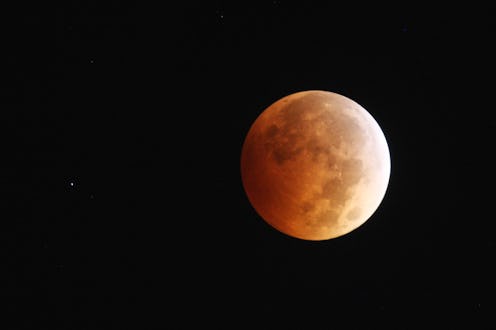News
Don't Miss The "Blood Moon" Eclipse On Saturday
If you're anything like me, you can't get enough of gazing up at the heavens. There's nothing quite like a clear night sky, especially if you're lucky enough to live in a place free from obstruction and light pollution. And on Saturday, anybody willing to make some precise plans will be able to get a real celestial treat — here's how to watch the "blood moon" lunar eclipse this weekend.
There's a good chance you've heard of these before, in no small part thanks to that dramatic, very slightly gory nickname, but don't let it fool you — the moon will hardly be oozing life come Saturday morning. Rather, the term "blood moon" (a term with seemingly religious origins) has become a popular moniker for moons within the "lunar tetrad" — four consecutive total lunar eclipses in a row. Saturday's will be the final one over the last year, so-called for the deep, reddish-orange hue that the moon takes on. They're not nearly so rare as full solar eclipses, which are kind of the gold standard in flat-out awesome sky-watching events, but they're striking and evocative all the same. And you've got the chance to ring in this Easter weekend with a prime example!
If you want to see it, however, you'll have to time things just right. This is projected to be the shortest lunar eclipse in this century, right around just five minutes in length, which reportedly makes it the shortest we'll see in the next 100+ years.
Here are the facts you'll absolutely need to know: The eclipse will be best seen from Eastern Australia, Japan, Hawaii, Northeastern Russia and western Alaska. AccuWeather reports that the farther west you are in the U.S., the better your view. As for timing, it's going down in the early hours of Saturday morning, with the blood moon phase visible from 7:58 a.m. EST to 8:02 a.m. EST, according to AccuWeather.
So, that means it'll be a truly early morning affair for you west coasters out there — 4:58 a.m. PST to 5:02 a.m. PST. And while that may sound like a drawback, I admit, you can take solace in knowing that the Pacific coast (California especially) is expected to have the clearest view of the moon, exempting any possible rain or storm conditions. In other words, even if it seems a little earlier than you'd usually drag yourself out of bed, it'll be a quick little glimpse of eclipse history, and you'll be curled up under the sheets again in no time.
I, for one, will absolutely not be missing it. One of the coolest things about these kinds of moments are how they can bind people together from all across the country and/or world, giving us all a shared moment of focus, recognizing something awe-inspiring on a massive scale. That's an opportunity that I don't think any early start time is worth passing up, so if you have the interest, and it fits responsibly into your schedule, why not take a look?
Images: Getty Images (2)
